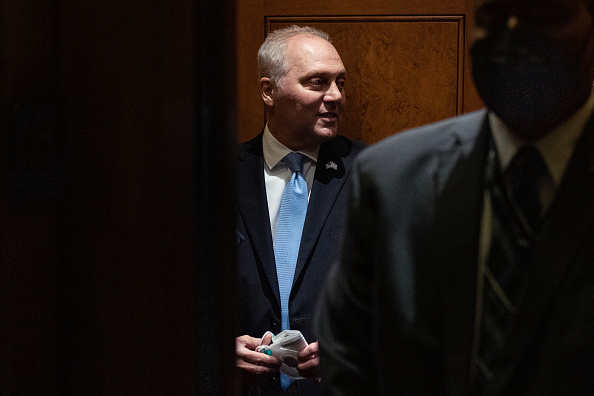House Republicans appear to be setting themselves up for another speaker election debacle reminiscent of the Jan. 2023 15-round voting marathon to get Kevin McCarthy (R-CA) into the lower chamber’s top job. Though Rep. Steve Scalise (R-LA) defeated Rep. Jim Jordan (R-OH) in a secret vote for the speaker nomination on Oct. 11, there was still a dearth of enthusiasm for the majority leader. After a closed-door huddle on Oct. 12, Scalise relinquished his nomination. For the time being, the House remains leaderless as GOPers try to avoid further embarrassment.
Scalise won the Republican nomination for speaker with 113 votes to Jordan’s 99. That was not by any means a comfortable margin. McCarthy got 188 Republican votes before his election went to the House floor. Scalise needed 217 votes from the 221-strong Republican conference to claim the gavel. Even though his rival for the speakership, Jordan, urged those who backed him to now throw their support behind Steve Scalise, Republican leaders have been unable to whip up the numbers they needed, even after giving the nominee a chance to win over more support.
At first glance, it would appear Jordan now has a clear path to the speakership – but not so fast. Will Scalise now do as Jim Jordan did and implore those who voted for him to support the current chair of the House Judiciary Committee? Will those who still prefer to reinstall McCarthy – a more establishment figure – be content with Jordan, who is aligned with the House Freedom Caucus? For the Republican Party, things just went from bad to worse. Steve Scalise, though, probably had little choice. The math just wasn’t in his favor.
Hard Math for Steve Scalise
Media reports put the number of GOP holdouts at anything between eight and 20. Marjorie Taylor Greene (R-GA), Lauren Boebert (R-CO), Chip Roy (R-TX), and at least five others had already signaled their intention to pick Jordan when the full House votes. Additionally, it’s a foregone conclusion that no Democrats would have jumped in to help Scalise. As one, Democrats will vote for their own nominee, House Democratic Leader Hakeem Jeffries (D-NY). Thus, there is now no timetable for bringing the vote for speaker to the floor – and no official GOP nominee.

(Tom Williams/CQ-Roll Call, Inc via Getty Images)
Rep. Matt Gaetz (R-FL), who ignited the ouster of Kevin McCarthy, announced his intention to back Steve Scalise. However, to complicate matters further, a few Republicans have mulled voting for McCarthy’s return. Steve Scalise was in even more of a precarious position than his nomination victory suggests. Of the 113 votes cast for him behind closed doors, three of them came from nonvoting members of the Republican conference. Del. Amata Radewagen of American Samoa, Del. James Moylan of Guam, and Puerto Rican Resident Commissioner Jenniffer Gonzalez Colon all backed Scalise but cannot vote on the floor of the House. In reality, then, the deficit facing the speaker-designee was 107 votes.
It was safe to assume that most of the 99 who voted for Jim Jordan would have fallen into line and backed Scalise, but just a handful of Republicans could have delayed the installation of a new speaker. Until then, Rep. Patrick McHenry (R-NC) will continue as Speaker Pro Tempore. There seems to be some confusion, even among elected representatives, over what McHenry can do to fill the void. According to Rule 1 of the House Rules, the Speaker Pro Tempore “may exercise such authorities of the Office of Speaker as may be necessary and appropriate to that end.” This somewhat vague clause has left a lot of people wondering just what constitutes “necessary and appropriate.” One would have thought most representatives from both parties consider everything the House does to be both necessary and appropriate. Probably, a great many Americans would argue that an awful lot of what Congress does is neither.
Thus, by some kind of general consensus, McHenry has been left holding the baby – or the gavel, in this case – with little power to move House business forward. Within the next four or five legislative days, Americans will find out whether Republicans are more focused on putting this fight behind them and getting back to business or ensuring they install a speaker who represents the correct direction for the Republican Party – whatever direction that may be. Which of these two paths should be considered the more important – the work of Congress or the future course of the party? There is no definitive answer to that question.

